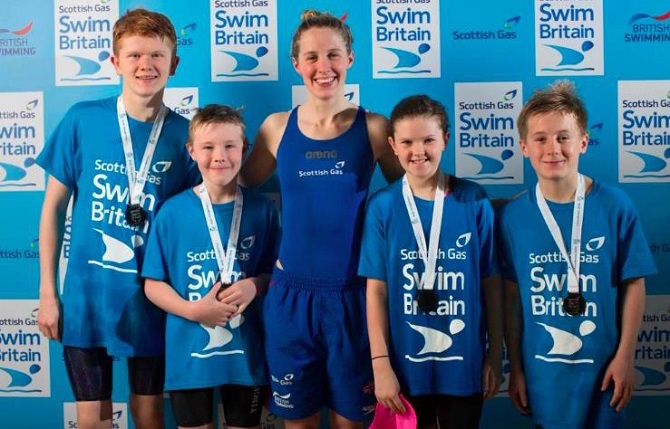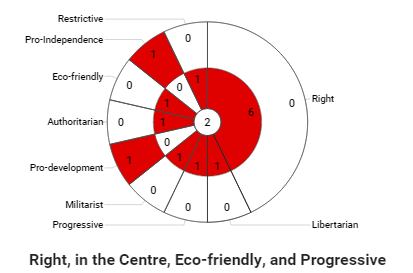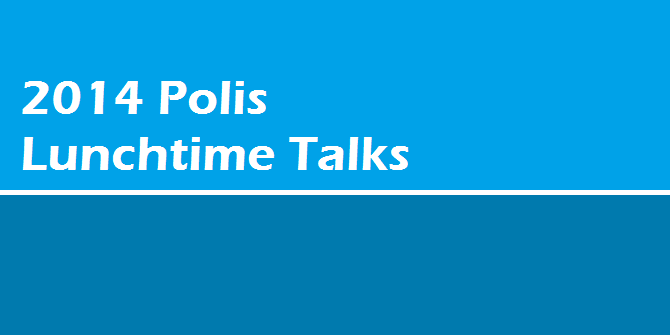Throughout the term Polis will be inviting a number of media and communications professionals and journalists to come speak to staff and students at lunchtime on Wednesdays. Bring your lunch and join us from 13:00-14:00 weekly as we listen to talks by speakers on topics such as working in political communications and verifying stories in the context of the crisis in the Ukraine.
“Battling for Truth: Russian propaganda, fake news and the war in Ukraine”
Location: NAB 2.06
Date: Wednesday, 29 October
Time: 13:00-14:00
 Yevhen Fedchenko will analyse how Russian government-sponsored and government-led propaganda became a powerful weapon in a war with Ukraine. Compared to military warfare impacting mainly East of Ukraine, information warfare and propaganda has great impact beyond the region, spreading to the rest of Ukraine, Russia and the West.
Yevhen Fedchenko will analyse how Russian government-sponsored and government-led propaganda became a powerful weapon in a war with Ukraine. Compared to military warfare impacting mainly East of Ukraine, information warfare and propaganda has great impact beyond the region, spreading to the rest of Ukraine, Russia and the West.
Fake news became cornerstone of disinformation campaign against Ukraine. Due to social media nature, they spread increasingly rapidly, stealing the narrative and destructing the journalism.
StopFake.org volunteer project was launched by students, alumni and faculty of the Mohyla school of journalism to fact-check and debunk fake news. We analyze Russian mainstream media outlets and social media and already debunked more than 300 false and twisted stories, photos, videos.
Yevhen Fedchenko is a co-founder of fact-checking website StopFake.org, Director of the Mohyla School of Journalism and the Head of Ph.D. Program in Mass Comm at National University of Kyiv-Mohyla Academy, Kyiv, Ukraine. He spent almost 20 years with media industry, covering international stories for different types of media.
“Disease, disaster and despair?’ Health stories from low- and middle-income countries in the Australian news media” A talk by Michelle Imison
Location: 32L G.06
Date: Wednesday, 5 November
Time: 13:00-14:00
 In high-income nations, mainstream television news remains an important source of information about both health and low- and middle-income countries (LMICs). A good deal is already known about the way that television treats these discrete areas of news, but there is very little literature about the news coverage of health from LMICs. This presentation will encapsulate the findings from my PhD thesis which, drawing on the University of Sydney’s Australian Health News Research Collaboration (AHNRC) database, addressed the issue in an Australian context.
In high-income nations, mainstream television news remains an important source of information about both health and low- and middle-income countries (LMICs). A good deal is already known about the way that television treats these discrete areas of news, but there is very little literature about the news coverage of health from LMICs. This presentation will encapsulate the findings from my PhD thesis which, drawing on the University of Sydney’s Australian Health News Research Collaboration (AHNRC) database, addressed the issue in an Australian context.
The presentation concludes by reflecting on the implications of Australian news and current affairs coverage of LMIC health for media audiences, government policy, development agencies and LMICs themselves.
Michelle Imison holds a Bachelor of Arts with Honours and a Masters of International Public Health, and has recently graduated with a PhD from the School of Public Health at the University of Sydney. She was an Australian Youth Ambassador for Development in Bangladesh in 2004-05 and a member of the Board of Oxfam Australia from 2008 to 2012.
“What’s it like to be a political journalist?” A talk by Paul Eastham
Location: Clement House, Room 6.02.
Date: Wednesday, 12 November
Time: 13:00-14:00
 In an entertaining talk, Paul Eastham, former Deputy Political Editor of the Daily Mail reflects on a career in political journalism.
In an entertaining talk, Paul Eastham, former Deputy Political Editor of the Daily Mail reflects on a career in political journalism.
As deputy Political Editor at the Daily Mail, Paul flew around the world with Prime Ministers and Cabinet Members, unearthed a string of agenda-setting scoops and developed a reputation for his tenacious reporting style. He was inside Qaddafi’s Bedouin tent when Blair and Qaddafi signed their deal, and his revelations included how Tony Blair agreed to reveal the name of Iraq weapons expert Dr David Kelly.
He is a fascinating speaker on the unique mixture of irreverence, grit and idealism which propels any good journalist. As well as anecdotes about Thatcher, Major, and Blair, Paul can also offer some striking reflections on British politics and the effects of the current Mail’s infamous editorship on British national life. Paul’s talks are down to earth, funny, and thoughtful, and he is particularly good at communicating the thrill of chasing and then publishing a story which sets the news agenda, and the qualities that motivate all good journalism: a belief in holding people to account, idealism and a sense of fun.
This event is particularly recommended for journalists, politicians, and everyone who aspires to be, and anyone involved in the changing media landscape in the era of Leveson and technological challenges to reporting and publishing.
“Wish you could shape the system the way it should be?- What if there was an app for that?”
Location: St Clement’s Building, Room 421
Date: Wednesday, 26 November
Time: 13:00-14:00
 Please join Mariam Cook, Founder of PositionDial, for an interactive intro covering PositionDial’s roots in democratic theory (studied at LSE!), a live demo of where it’s at, discussion on where it’s going, what you want it to be and how to get involved.
Please join Mariam Cook, Founder of PositionDial, for an interactive intro covering PositionDial’s roots in democratic theory (studied at LSE!), a live demo of where it’s at, discussion on where it’s going, what you want it to be and how to get involved.
What is PositionDial? We answer questions like these in real time: Which MPs best match my Position?How closely is my MP representing my views? Is the coffee shop I’m in paying its workers a Living Wage? Which election candidate running in my Constituency best matches my Position?
PositionDial is a new and rapidly developing web app enabling everyone to:
See the different sides of issues you care about
- Know yourself better: Work out where you stand on your own personal PositionDial
- See instantly which politicians, brands and businesses match your Position
Visit: PositionDial.com Follow: @PositionDial
Mariam Cook, Founder & CEO of PositionDial, is an LSE alumna with a background in media, marketing, politics and communications including digital engagement consultancy for The Guardian, openDemocracy and Digitas. She graduated with distinction from LSE in 2010 with an MSc in Communication, Information & Society, an interdisciplinary course across the Information Systems and Innovation group and the Media & Communications Department.
A map of the LSE is available here






Instead of doing what is simple – by scrutinising and criticising external news media – shouldn’t we be asking, debating and scrutinising whether we are part of a better news media – one that is willing to harness the voices of those whose stories are real, factual and detrimental to the lives and social mobility aspirations they seek?
We have to start measuring how many emails and telephones are made by the public to newspaper journalists and television new media’s… and how many of those stories are actually developed as a story to highlight a much wider problem in our society and to hold politicians and powerful bodies to account. Shouldn’t this be the starting point – at least a motivation to ensure that BRITISH people are given a VOICE amid any outside news media organisation such as RT?
For example, I know a friend who took an OVERDOSE as a direct result of failings by a government policy. These failings were wide spread and the news media – even with the word ‘overdose’ placed in capital letter in the heading of emails – NEVER even gave a response to my friend. Now, if you believe that is appalling, there is more… much more. So, isn’t there a fundamental need to test and measure how effective and how broad and how community focused our news media actually is? Or, is it the case that the UK news media already has its news agenda bolted… and communities and people who desperately want a VOICE is never a priority?
I ask that amid the focus on RT that there is also a good look at our own British news media.